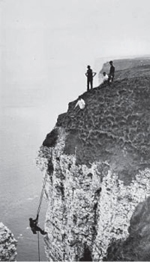3.1 The example of St Kilda
Vygotsky argued that it is impossible to understand learning fully without taking into account the effect of living in a particular society, at a particular time. One example of this would be the learning that occurred on the Scottish island of St Kilda – now no longer populated.
The people who used to live on this island needed to collect eggs and to catch some of the birds that nested on the island. These were an important source of food for a population that could be cut off from the mainland by bad weather for many weeks. However, the cliffs where the birds nest often reach more than 1,000 feet above sea level.

In order to collect the eggs, a crucial part of the learning needed by St Kildans was how to climb the cliffs so, as a young St Kildan grew up, there would come a point where he or she might be taken out onto the cliffs by an experienced climber.
Perhaps they would start with parts of the cliffs that were not quite as dangerous as others and gradually progress to the trickiest climbs. The point is that St Kildan society provided a framework to enable people to develop important skills and knowledge that were relevant to living in their society. This knowledge was held by the St Kildan society as a whole, and made available to people as they became ready for it.
